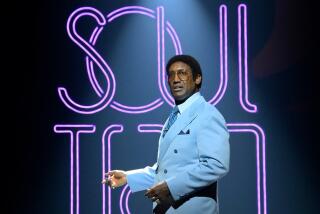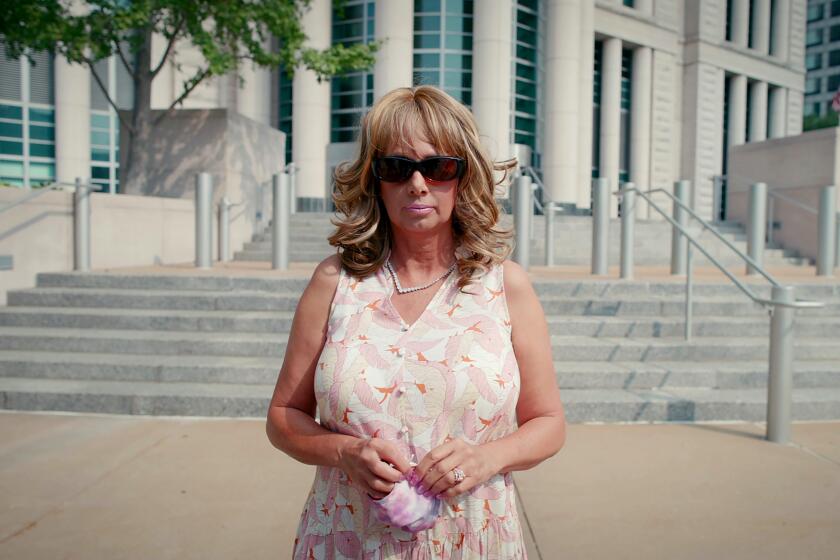‘Oscar Hammerstein II: Out of My Dreams’ details Broadway pioneer
Oscar Hammerstein II’s lyrics reflected his personality and belief system, making him one of the first to transform the genre of the Broadway musical from lighthearted boy-meets-girl frivolities to more substantial intellectual shows.
The lyricist-librettist-producer explored the subject of miscegenation in the seminal 1927 musical “Show Boat,” which he wrote with composer Jerome Kern. In 1945’s “Carousel,” his second collaboration with composer Richard Rodgers, Hammerstein presented a romantic drama fantasy that dealt with death, heaven and forgiveness. And in the 1949 Rodgers and Hammerstein masterwork, “South Pacific,” Hammerstein looked at racism especially in his song “You’ve Got to Be Taught.”
“I thought the song ‘You’ve Got to Be Taught’ really educated a lot of people to make them think about the civil rights subject,” said JoAnn Young, director of the new PBS special “Oscar Hammerstein II: Out of My Dreams,” airing Sunday on KOCE. The special is hosted and narrated by “Glee’s” Matthew Morrison, who appeared in the Lincoln Center revival of “South Pacific” four years ago.
Among the more than a dozen new interviews, plus archival ones with Hammerstein and his late son James, is Tony Award-winning producer-director Harold Prince, who had an acquaintance with Hammerstein in the 1950s.
“He was a very political fellow without being, you know, cantankerous or bullish,” said Prince, who directed the award-winning 1994 revival of “Show Boat.”
“He was very concerned with human rights and they were reflected in his musicals,” Prince said. “The idea of someone dealing with all [racism and miscegenation] in 1927 is pretty damn extraordinary.”
“It’s funny what we call liberal now and what we call liberal back then,” said Andy Hammerstein, who lectures about his grandfather and is the author of “The Hammersteins: A Musical Theatre Family.”
“He was a very pre-hippie, pre-drug small ‘l’ liberal,” said Hammerstein, who was 3 when his grandfather died in 1960 of cancer. “He was a writer, and a writer doesn’t like to have someone in the government tell him what he can or cannot write or make suggestion on what he should be writing.”
As a result of his liberal leanings, his grandson said, Hammerstein was not popular with FBI director J. Edgar Hoover. And during the House Committee on Un-American Activities hearings, Hammerstein was called in to testify informally if he was or had ever been a member of the Communist party.
“He was asked the usual set of questions and his responses were interesting,” said his grandson. “When he was asked would you ever work with a Communist, he surprised them by answering, ‘Of course I would. If there are going to help me load my gun to shoot Nazis’ — which is what the Russians had just done — ‘I would be happy to work with them.’
“It kind of shut them up.”
Mitzi Gaynor, who starred as Nellie Forbush in the 1958 feature film version of “South Pacific,” describes Hammerstein as a mensch. “He was a real person and a real human being,” she said, adding that she felt he was very much like the sentiment of the “South Pacific” song, “A Cockeyed Optimist.”
“I think that’s what he thought,” she said. “He was very optimistic. He was not a sour man in any way. He believed in our way of life.”
Hammerstein II was also a surrogate father to a very young Stephen Sondheim.
“Oscar wasn’t just a surrogate father, Oscar and Dorothy were a surrogate family,” said Young, the documentary’s director. “Sondheim felt as if they saved him. He was having a bad afternoon [one day]. He was having a terrible scene with his mother and he goes over to Hammerstein’s house and they try to comfort him. Then Oscar says, ‘Here are my lyrics for one of the songs from “The King and I.” Why don’t you try to set that to music,’ giving the boy something to do. I think that was so wonderful.”
Prince, who had an acquaintance with Hammerstein, recalled a story he heard about his reaction when he learned he had terminal cancer. “He said to Dorothy: ‘What right do we have to complain?’ That was his take on the information. That would be very characteristic of him.”
More to Read
The biggest entertainment stories
Get our big stories about Hollywood, film, television, music, arts, culture and more right in your inbox as soon as they publish.
You may occasionally receive promotional content from the Los Angeles Times.











